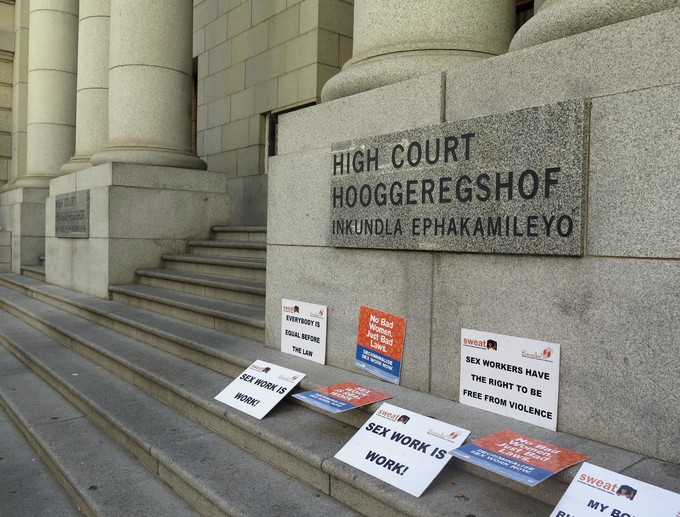New delay in sex worker murder trial
Trial of artist Mthethwa postponed again
Nearly three years ago Nokuphila Kumalo, a sex worker, was beaten to death in Woodstock. The trial of artist Zwelethu Mthethwa, accused of the murder, beset with postponements from its start in 2013, was delayed again today for the second time this week.
The reason for today’s delay was twofold—the Shona interpreter for a Zimbabwean man who was set to take the stand was very sick, and there was a need to compile a “working document” of the papers that forensic pathologist Dr Linda Liebenberg might refer to.
This “working document” will contain information about commotio cordus, which is what Liebenberg believes killed Kumalo. Commotio cordus is when the heart rhythm is disrupted by a sudden, blunt trauma to the chest, resulting in cardiac arrest.
Mthethwa was seen laughing and smiling outside the courtroom this morning.
Throughout the trial, activists from the Sex Workers Education and Advocacy Taskforce (SWEAT),sometimes two or three, sometimes many more, have been a constant presence outside the court. Lesego Tlhwale, spokesperson for SWEAT, said reduced numbers of activists outside the court recently did not mean the organisation was losing hope. SWEAT would come out in force on key dates, she said.
Glynnis Benthan, a lobby officer at SWEAT who was outside the court this morning, said that last year she was there through rain and storms. “We want justice. This girl is a “no name” but we are here to say she is somebody,” said Benthan.
Speaking of the long wait for justice she said, “The system takes so long, it breaks you down.”
But she said that when there were successful convictions in cases such as Kumalo’s it showed the world that “this is not nobody”.
Benthan said she didn’t think perpetrators of violence against sex workers would “get so violent so quickly” if sex work were decriminalised. “They [sex workers] know they can’t go to the police station, so they [perpetrators] get away with it,” she said.
“The only thing that is going to help is decriminalisation,” said Benthan.
SWEAT has long been campaigning for the decriminalisation of sex work and last year the Asijiki Coalition for the Decriminalisation of Sex Work was launched, supported by SWEAT, the Sisonke Sex Worker Movement (Sisonke), the Women’s Legal Centre (WLC) and Sonke Gender Justice. The coalition believes that decriminalisation will reduce gender-based violence, the prevalence of HIV and create safer spaces for sex workers to work.
The trial is set to resume tomorrow at the Western Cape High Court.
Support independent journalism
Donate using Payfast

Don't miss out on the latest news
We respect your privacy, and promise we won't spam you.
Next: Students left to study under trees after school roof blows off
Previous: Detainees go to court over conditions in Pollsmoor
© 2016 GroundUp. 
This article is licensed under a Creative Commons Attribution-NoDerivatives 4.0 International License.

